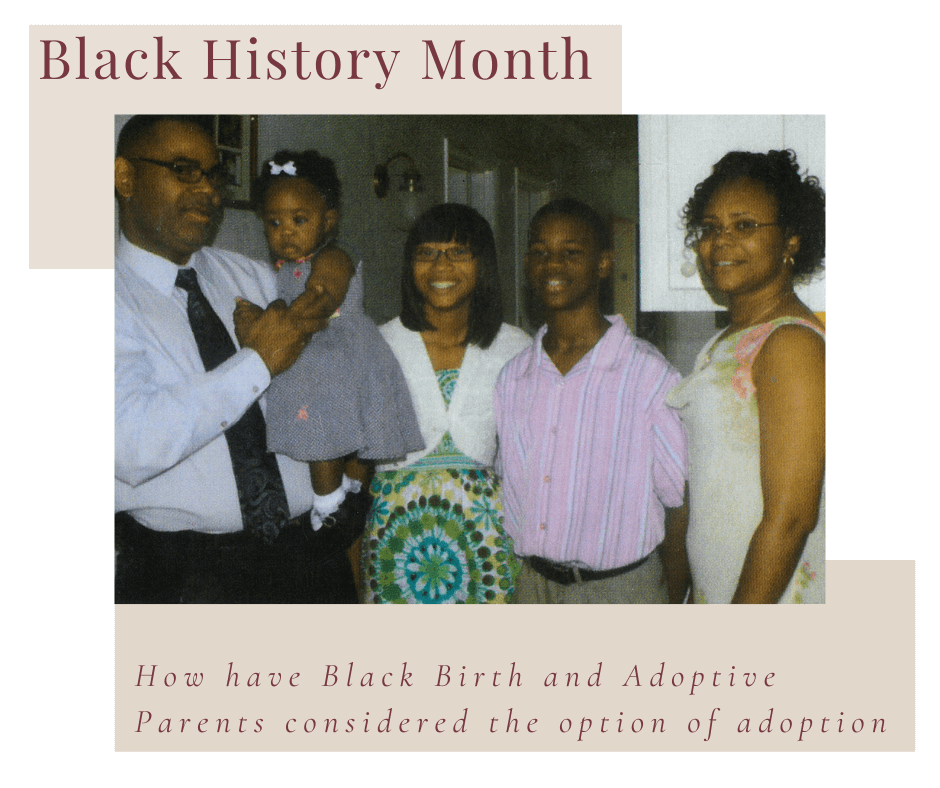
As we celebrate Black History Month across the United States, we would like to think about how Black Birth and Adoptive Parents have considered the option of adoption. It’s 2023, and we know that any woman with an unplanned pregnancy has options for her baby. Faith Based pregnancy centers offer supplies to new moms who choose to parent, while adoption agencies in Florida provide families for her to place her baby. However, this has not always been the case.
According to The Adoption History Project:
For a good part of the twentieth century, African-American birth parents and children were simply denied adoption services by agencies because of their religion, race, or both. In some states with large African-American populations, such as Florida and Louisiana, not a single African-American child was placed for adoption by an agency for many years running as late as the 1940s. Discriminated against and reluctant to establish racially-exclusive organizations when integration was synonymous with equality, African Americans relied instead on traditions of informal adoption to take care of their own. (1)
What did those “informal adoptions” look like? One example was recorded by Booker T. Washington in his book Up From Slavery, written in 1901. After leaving enslavement, Booker’s mother, June Washington, moved with her children to West Virginia to be with her husband. One day, June brought home an orphan, who they named James and adopted into the family.(2) This was simply a child who needed a family, and June may have brought him home without consulting her husband. It seems that Booker, and his other biological brother, accepted James as well. As adults, Booker, John and James chose to live, and work, in Tuskegee, Alabama.
Since Black Birth Parents were unable to receive any guidance during an unplanned pregnancy, or given the option of adoption in earlier eras, extended family who could provide for the child may have taken them in. At other times, it may have been close friends. No day in court for such children to share the last name of their caregivers, but they were taken into the family and treated as family.
On average,Black Americans are informally adopted at higher rates compared to other racial groups. Black American grandparents specifically are more likely to be primary caregivers of their grandchildren than the general population. And while many other groups have a tradition of taking care of relatives in need, sociologists and child-care advocates say informal adoption is a distinctly African American cultural phenomenon. (3)
While Black Birth Parents and families may still choose to adopt informally, as years passed, adoption guidance became available to Black women with unplanned pregnancies. Eventually, government programs made attempts to reach and encourage Black couples to adopt.
Before the 1960s, “Negro” adoption referred to the permanent placement of African-American children or mixed-race children who had one “Negro” birth parent. When adoption services were extended to children of color, they were strictly segregated and matching mattered just as it did for their white counterparts. But these children were placed in families so infrequently before 1945 that “Negro” adoption was considered part of the revolution inaugurating special needs adoptions after World War II. Adoption resource exchanges that published monthly listings of waiting children and families were first used to find homes for “Negro” children. By the late 1960s, these exchanges were widely used to place all “hard-to-place” children. (1)
As a private adoption agency in Florida, CFS rarely has a black family on our waiting list. When we are blessed to have such a family, they are not on our list very long! As one hopeful adoptive parent learned from their adoption agency “… many black expectant/ birth parents prefer to have black families adopt their children, but don’t often have a significant pool of black adoptive families to choose from.” (4)
It is important to provide Birth Parents the option of adoption for their baby. CFS Caseworkers provide counsel to women with unplanned pregnancies, and listen to what type of family they would like to parent their child. It is also important to CFS to guide families through the adoption process, which include access to grant funding their adoption expenses.
This is not meant to be an exhaustive review of the subject.
1. The Adoption History Project
https://pages.uoregon.edu/adoption/topics/AfricanAmerican.htm
2. Dr. Booker T. Washington, Up From Slavery
https://docsouth.unc.edu/fpn/washington/washing.html
3. Non-formal adoption by black families
https://whyy.org/segments/how-informal-adoptions-became-a-mainstay-of-african-american-family-life/
4. WAT! Helping black families adopt
https://watadoptions.org/our-founder/
Are you an expectant mom in Florida, and want to consider adoption for your baby? Reach out to CFS, a local adoption agency near you. We are ready to answer your call or text to discuss judgment free options with you. Consider your options for your unplanned pregnancy. Speak with us 24/7 by voice @ 8002262367 or text @ 3523786202
CFS counselors are ready to assist you with your pregnancy options, whether you live in Dunnellon, Silver Springs Shores, McIntosh, Reddick, Belleview, Anthony, Ocala, Baldwin, Atlantic Beach, St. Augustine, Neptune Beach, Jacksonville Beach, Ponte Vedra Beach, Hastings, Nocatee, Jacksonville, Woodville, Crawfordville, Wakulla Springs, Havana, Miccosukee, Wacissa St. Marks, Tallahassee, Alachua, Micanopy, High Springs, Melrose, Keystone Heights, Newberry, Archer, Hawthorne, La Crosse, Lake Butler, Waldo or Gainesville, Florida or anywhere in between!
